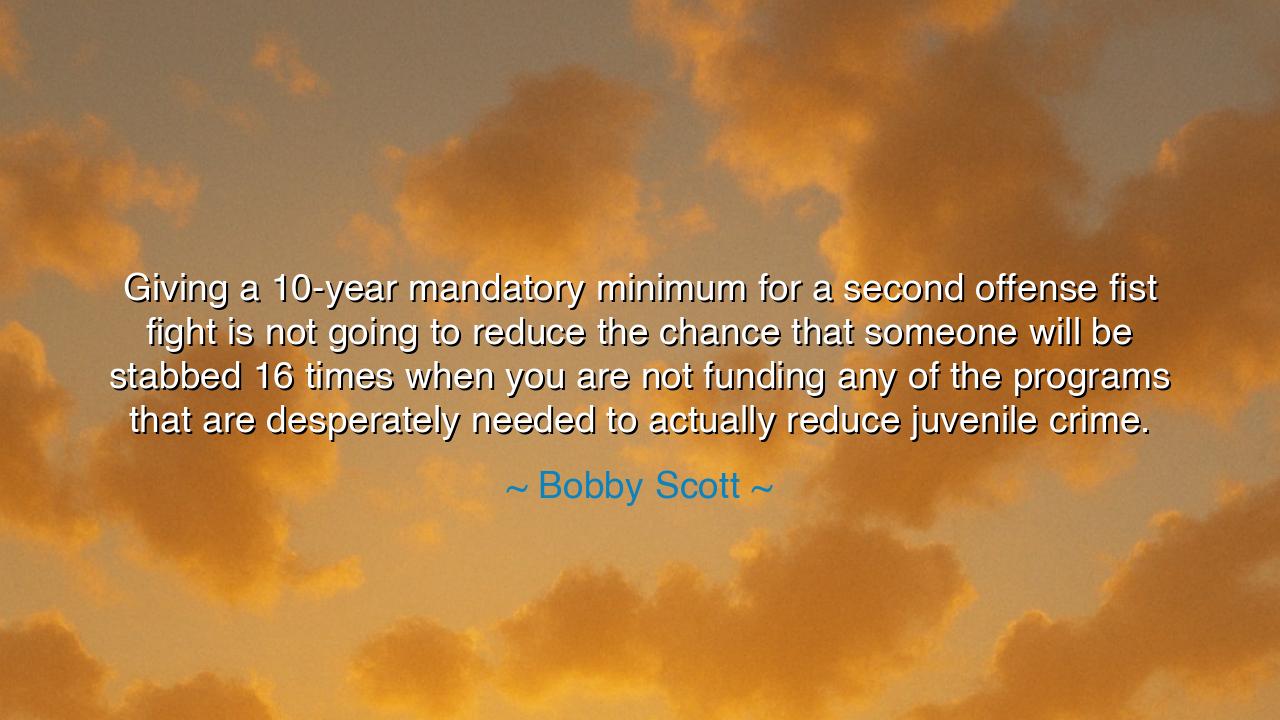
Giving a 10-year mandatory minimum for a second offense fist
Giving a 10-year mandatory minimum for a second offense fist fight is not going to reduce the chance that someone will be stabbed 16 times when you are not funding any of the programs that are desperately needed to actually reduce juvenile crime.






In the words of Bobby Scott, "Giving a 10-year mandatory minimum for a second offense fist fight is not going to reduce the chance that someone will be stabbed 16 times when you are not funding any of the programs that are desperately needed to actually reduce juvenile crime," we hear a profound call for justice and true reform in the face of ineffective policies. Scott’s quote points to the dissonance between punitive measures and the root causes of crime, challenging us to reflect on whether we are truly addressing the issues at hand, or merely applying superficial solutions that fail to bring lasting change. His words remind us that punishment alone is insufficient; what is needed is a deeper commitment to prevention, education, and social support, which can address the underlying issues that lead to crime.
In the ancient world, lawmakers and philosophers alike grappled with the question of justice and the best way to protect society. Plato, in his Republic, sought to create a society where justice wasn’t just about the punishment of wrongdoers, but the education and prevention of wrongdoing. He understood that for a society to thrive, it must invest in the well-being of its citizens, especially the youth, who represent the future of that society. Similarly, Aristotle believed that true justice required not just the application of laws but the creation of an environment where individuals were provided with the means to live virtuous lives. Both Plato and Aristotle recognized that punishment alone cannot address the complex causes of crime, but rather, the whole society must engage in the creation of structures that prevent crime from arising in the first place.
Scott’s critique of the mandatory minimum sentences is a recognition that punishment, when not coupled with proactive, preventative measures, does little to address the underlying causes of violence and criminal behavior. The story of Rome and its approach to criminal justice serves as a powerful example. The Roman legal system was built on a principle of restoration as well as punishment—for instance, the Romans often sought to resolve conflicts through mediation or compensation rather than strictly through the application of harsh penalties. The notion was that restorative justice—which addresses the root causes of crime—was more likely to create lasting peace and prevent further harm than simple retribution. In modern society, as Scott points out, without programs that actually address the needs of vulnerable communities, such as education, mental health care, and youth development, punitive measures will fail to reduce crime in the long term.
The historical example of Napoleon Bonaparte, though a figure of controversy, also speaks to the importance of structural reform. Napoleon’s reforms of the French legal system, particularly his Code Napoleon, sought not only to enforce laws but to create a framework that promoted social stability and equality. By instituting policies that reformed education, civil rights, and the economy, Napoleon understood that effective leadership requires addressing the fundamental structures of society. Similarly, Bobby Scott urges us to reconsider our approach to criminal justice—punishment alone is insufficient. The root causes of juvenile crime lie in a complex interplay of social, economic, and psychological factors, and it is investment in preventive programs that will truly protect our communities.
Scott’s quote draws our attention to a critical lesson: true justice is not about responding to crime with harsher punishments, but about addressing the systemic issues that lead to criminal behavior. This is a call to move beyond short-sighted solutions and invest in programs that provide young people with opportunities for growth, education, and support. Whether through mentorship programs, after-school initiatives, or mental health services, the investment in the well-being of the most vulnerable is an investment in the future of society. As the ancients knew, lasting peace and justice are built not on the backs of the punished, but on the foundation of a society that prevents harm by fostering well-being.
In our own time, we must ask ourselves: How can we contribute to the long-term prevention of crime? Are we focusing on punishment, or are we creating systems that help young people learn and grow in healthy, supportive environments? We can no longer afford to view crime as something to be dealt with only after it happens. Just as Plato and Aristotle urged their societies to invest in the future of their citizens, we too must turn our attention to prevention—to creating a society where the root causes of crime are addressed with wisdom, compassion, and action.
Let us take Bobby Scott’s words as a call to reform—to reject the cycle of ineffective punishment and invest in holistic solutions that will actually change the conditions that lead to crime. This is not a battle for tomorrow, but one for today. By focusing on the nurturing of future generations, by investing in education, community support, and mental health care, we can build a society that is not just safer, but more just, where the well-being of all is a priority, and where the true cause of crime is addressed before it ever begins.






AAdministratorAdministrator
Welcome, honored guests. Please leave a comment, we will respond soon